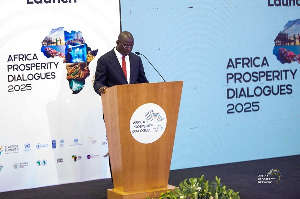Finance Minister Dr. Amin Adam has outlined a number of key strategies that deeply align with Ghana's vision for a more interconnected and prosperous Africa and the AU agenda 2063.
Speaking at the launch of the Africa Prosperity Dialogue 2025 in Accra on May 13, the finance minister said that Africa must recognize that the continent cannot achieve sustainable prosperity in isolation and therefore requires constant effort and collaboration.
He first highlighted that a primary focus should be placed on Adequate Infrastructure Development, which he believes is hampering Africa’s economic growth.
“Africa's infrastructure deficit impedes economic growth and development. Inadequate networks of road, rail, air, and waterways make transport costs in Africa among the highest in the world,” he stressed.
The minister continued, “We must redouble our efforts to invest in critical infrastructure projects, including transportation, energy, and digital connectivity, to unlock Africa's full potential for trade and investment.”
Another obstacle that the finance minister highlighted must be critically addressed is the escalating debt-to-GDP ratio across the continent, estimated by the UNECA at 66% in 2023.
For his second point, Dr. Amin Adam urged for continued efforts for Stronger Regional Integration, which he says is a key feature of Africa's trade.
He stressed that a lack of regional integration has had some adverse implications on economic growth and development, as well as high external orientation and a relatively low level of intra-regional trade
“In truth, when we, as Africans, work together with a shared vision, we can overcome logistical barriers and unlock the full potential of regional integration, trade facilitation, and economic development.
"I call on ECOWAS and the African Union to lead by example and spearhead initiatives to promote cross-border infrastructure investments and connectivity.” Ghana’s finance minister said.
Dr. Amin Adam concluded that measures must be taken towards Strategic and Innovative Financing, which he explains that traditional financing mechanisms may no longer suffice in meeting the growing demands of rapidly expanding economies.
“We must explore new avenues for mobilizing resources, including public-private partnerships (PPPs), green bonds, and leveraging digital technologies to enhance financial inclusion and access to capital. PPPs have proven to be effective mechanisms for leveraging private sector expertise,” he stated.
The finance minister, in his concluding remarks, encouraged African governments to embrace PPPs as a viable solution to bridge the infrastructure gap and drive economic growth.
MA/NOQ
Business News of Monday, 13 May 2024
Source: www.ghanaweb.com
Finance Minister highlights three key strategies to propel Africa's economic prosperity
Business
















